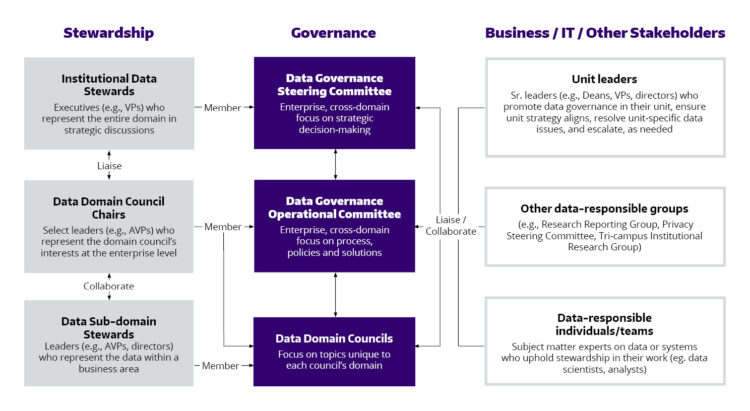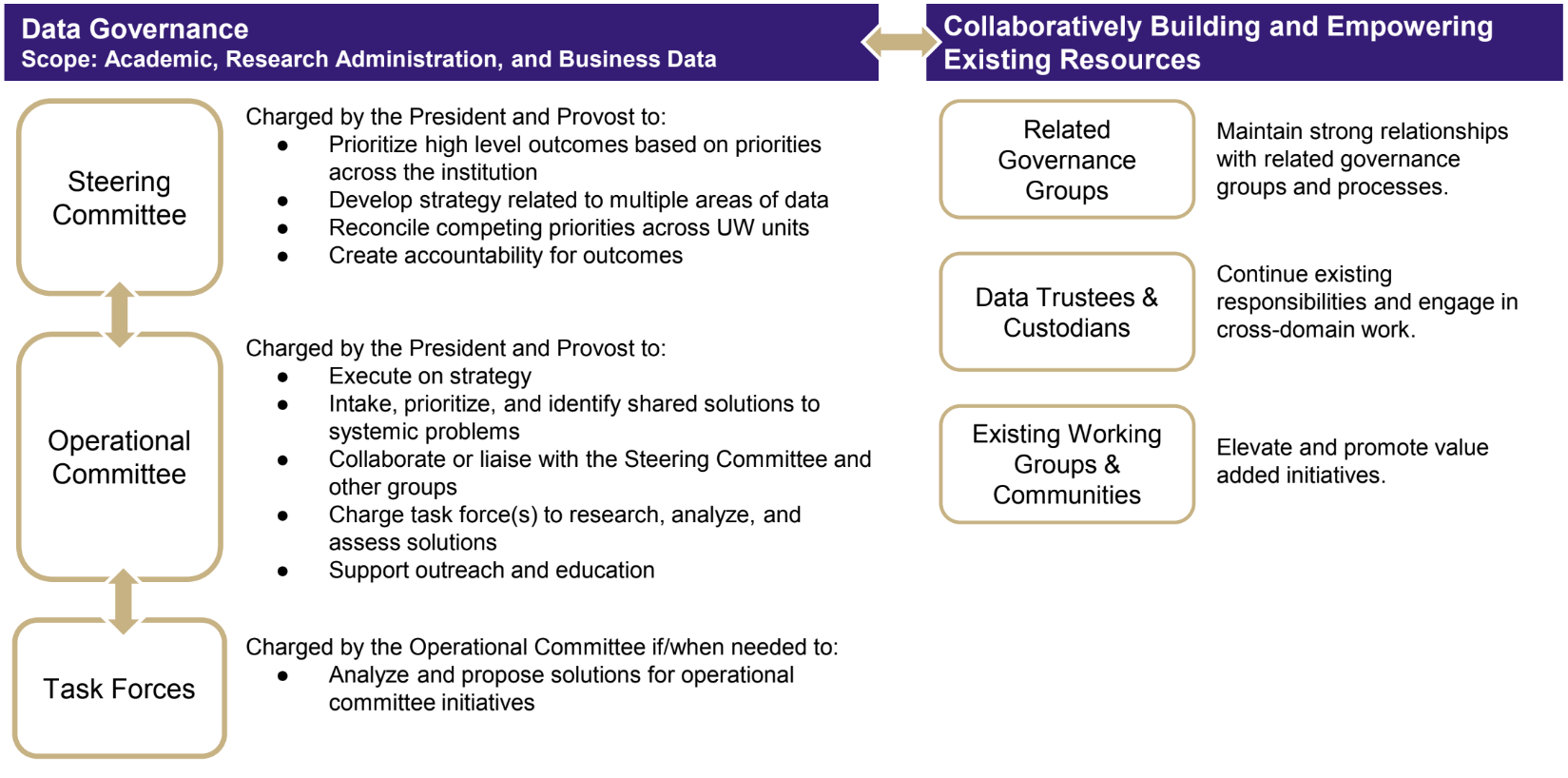In 2020, UW Data Governance benchmarked, gathered input, and developed an updated approach for data stewardship at the UW. The former model of Data Custodians and Trustees has been replaced with a new model that more closely links data stewardship and data governance, encourages collaborative leadership and engagement through the creation of data domain councils, and avoids siloed decision-making.
In the new model, there are three types of data stewards: institutional data stewards, data domain council chairs, and sub-domain stewards. There are six data domains at the UW: Finance, Human Resources, Advancement and Alumni Relations, Research, Academic, and Property and Space Management. Data stewards of all levels in each of the six data domains meet as a domain council and address issues specific to their area. Cross-domain issues are brought to the Data Governance committees, whose membership includes stewards from each of the domains.
98% of data governance-involved respondents in a Spring 2023 survey stated that the “launch of a new stewardship model, with six data domain councils to address domain-specific issues” was extremely valuable or somewhat valuable.
The relationship between stewardship, governance, and other key stakeholders is described in the graphic below. Learn more about the model and access onboarding materials for new stewards

In 2019 Provost Mark Richards and President Ana Mari Cauce charged a Data Governance Steering Committee and Data Governance Operational Committee with executing a comprehensive data and analysis strategy for the University. The new data governance structure is illustrated below:
The two committees include members who are key stakeholders in data management from across the UW’s three campuses. The charges for both committees ask them to work on behalf of the UW as a whole, incorporating a range of perspectives, representing all areas of data in scope, and drawing from intellectually diverse perspectives. The work of these two groups will promote informed decision-making and shared solutions, create buy-in and enable positive culture change, and apply experience and expertise to ensure data strategies come to fruition.
In September 2018, Provost Richards convened a small group of senior leaders in a Data Governance and Analysis Committee to review the recommendations of the Data Governance Task Force and advise him as to their wisdom and feasibility, with the ultimate goal of creating and fostering a best-in-class environment for institutional analysis. The scope of work was limited to academic, research administration, and business data, and excluded other areas such as patient data.
This group ultimately confirmed the recommendations of the Task Force and further refined the proposed two-tiered structure for Data Governance.
In response to a memo from key faculty and staff, Provost Jerry Baldasty charged a Data Governance Task Force to examine the current needs related to data governance at the UW.
Much had changed since the original DMC was originally formed in 2006. The UW’s diverse data, systems and business processes were becoming increasingly complex. Data privacy and security were ever larger concerns. Rapid change in technology during a time of limited resources meant strategic prioritization would be key.
The task force was asked to recommend that the DMC either remain, be modified or be replaced to best address data needs, policy needs, impact, value and risk of data, compliance and accountability.
The task force presented the below recommendations to the Provost in the spring of 2018:
- Create a new, two-tiered data governance structure that has a steering and operational committee with the initial scope that included Seattle, Bothell, and Tacoma academic, research administration and business data.
- Designate 2 FTE for supporting the governance groups and initiatives.
- Include members who were intellectually diverse and could promote collaboration across multiple areas of data on behalf of all UW.
They proposed the following two-tiered structure:
Steering Committee
Charged by the President and Provost to:
- Prioritize high-level outcomes based on priorities across the institution
- Develop strategy related to multiple areas of data
- Reconcile competing priorities across UW units
- Create accountability for outcomes
Operational Committee
Charged by the President and Provost to:
- Execute on strategy
- Intake, prioritize, and identify shared solutions to systemic problems
- Collaborate or liaise with the Steering Committee and other groups
- Charge task force(s) to research, analyze, and assess solutions
- Support outreach and education
In 2016, a group of 25 university leaders representing both academic and data-responsible groups, sent a memo to Provost Jerry Baldasty requesting that the UW either reconvene the Data Management Committee or find another mechanism to address issues related to data governance.
(Memo is available upon request. Contact datagov@uw.edu for more information.)
In 2006, Provost Phyllis Wise created the Data Management Committee (DMC) to address issues related to data and information management across the UW campuses. The charge and membership was later revised by Provost Mary Lidstrom in 2010 but the core work remained largely the same. The 2010 charter letter from the Provost asked the group:
- To be consistent in the approach, designation, and governance of data, metadata, and the information base of business processes.
- To define clear and commonly used structures, models, definitions, and processes to support coordination and collaboration, effective decision-support and efficient operations University-wide.
- To provide guidance and recommendations concerning our institutional data related to expanding access, improving quality, strategic planning, assuring security and business performance management.
During the eight years it was active, the Data Management Committee:
- Helped enforce University-wide data management policies, standards, guidelines and operating procedures related to institutional data assets.
- Advised on University-wide strategic plans for data management including sourcing, distribution, maintenance and quality.
- Advised on data management practices for decision making including data warehousing, business intelligence, master data management and metadata management.
- Recommended and approved controls for assessing data management value and risk.
- Worked to develop consistent definitions and classifications according to data management standards and guidelines.
- Coordinated compliance requirements related to laws and regulations.
The DMC was suspended in 2014 during the implementation of Workday for HR/Payroll.
